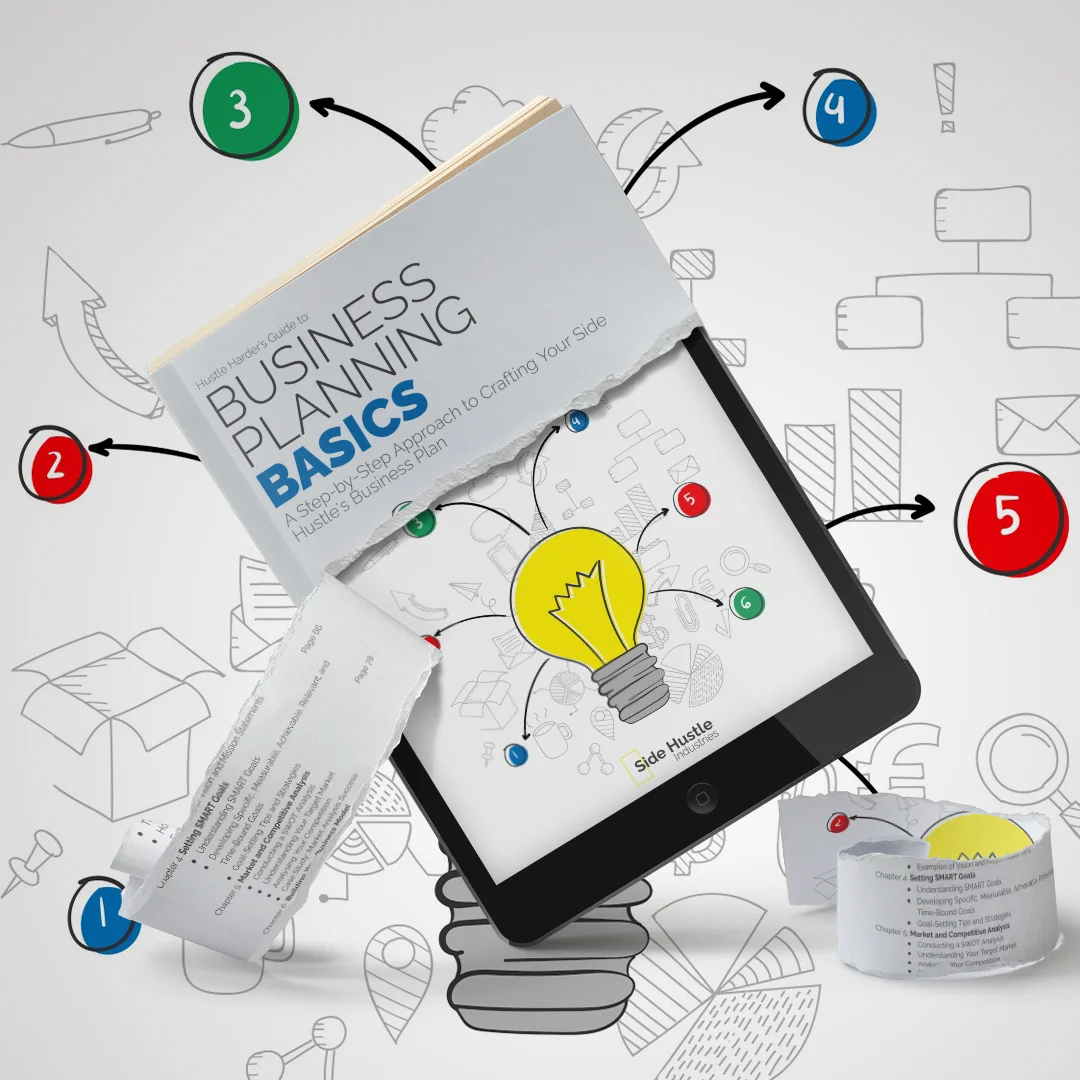
In the world of entrepreneurship, the phrase “failing to plan is planning to fail” couldn’t be more apt. A well-crafted business plan isn’t just a mere formality; it’s your secret weapon, your shield, and your key to unlocking a world of opportunities. It’s the backbone of your side hustle, and it’s packed with a myriad of benefits that can propel you towards success. In this section, we’ll delve into these benefits and why having a solid business plan is an indispensable asset for any entrepreneur.
Clarity and Focus
One of the primary advantages of creating a business plan is the clarity it brings to your entrepreneurial vision. It forces you to articulate your ideas and objectives in a structured manner. This process alone can be illuminating. Many aspiring entrepreneurs have a general sense of what they want to achieve, but without a clear plan, those ideas often remain vague and unattainable.
Your business plan serves as a roadmap, breaking down your vision into achievable goals and actionable steps. It answers critical questions such as:
- What problem does your side hustle solve?
- Who is your target audience, and what are their needs?
- What unique value does your product or service offer?
- How will you reach your customers and promote your brand?
- What are your short-term and long-term business goals?
This clarity and focus provide a sense of purpose, making it easier to stay on track and avoid distractions. When you’re clear on your mission and goals, you’re less likely to veer off course or lose sight of what you set out to achieve.
Tip: When crafting your business plan, be specific and detailed in defining your vision and objectives. This clarity will serve as a compass for your entrepreneurial journey.
Goal Setting and Accountability
Success in entrepreneurship isn’t just about dreaming; it’s about setting actionable goals and holding yourself accountable. Your business plan is a powerful tool for goal setting and tracking your progress. It prompts you to establish both short-term and long-term objectives that are Specific, Measurable, Achievable, Relevant, and Time-Bound (SMART goals).
Having defined goals creates a sense of purpose and urgency, motivating you to take consistent action. It also provides a basis for measuring your success and determining where you need to pivot or improve. Regularly reviewing your goals against your actual results allows you to stay focused and adjust your strategies as necessary.
For instance, your business plan might include goals like:
- Launching your product within six months
- Acquiring 1,000 paying customers within the first year
- Achieving a 20% month-over-month revenue growth for the first quarter
- Expanding into a new market within two years
These specific goals become your targets, driving you to work diligently towards their achievement. And as you achieve these milestones, it becomes a source of motivation and evidence of progress.
Tip: Make your goals challenging but achievable. Push yourself, but also ensure that your goals are realistic given your resources and constraints.
Risk Mitigation
Entrepreneurship inherently involves risk, and while it’s impossible to eliminate all risk, a solid business plan can help you manage and mitigate it. By conducting thorough market research, competitor analysis, and financial forecasting, your plan equips you with the insights and strategies needed to navigate potential pitfalls.
Here’s how your business plan can help mitigate risks:
Market Research: By understanding your target market, you can identify potential challenges and adapt your strategies accordingly. You may discover underserved niches or shifting consumer preferences, allowing you to position your side hustle effectively.
Competitor Analysis: Analysing your competitors helps you identify potential threats and opportunities. It allows you to differentiate your offering, refine your value proposition, and even anticipate competitive moves.
Financial Projections: Accurate financial projections and budgeting provide a clear picture of your business’s financial health. You can plan for contingencies and ensure you have the financial resources to weather unexpected challenges.
Legal Considerations: Understanding the legal and regulatory landscape related to your business helps you avoid legal pitfalls that could derail your venture. This includes issues related to business structure, permits, and intellectual property.
In essence, your business plan acts as a risk management tool, helping you anticipate and prepare for potential roadblocks. When you’re aware of the risks and have strategies in place to address them, you’re better equipped to navigate the unpredictable terrain of entrepreneurship.
Tip: When conducting market research and competitor analysis, be thorough and stay updated. The more you know about your market and competition, the better you can mitigate potential risks.

Investor Attraction
For many entrepreneurs, securing funding is a critical step in turning their side hustle into a thriving business. Whether you’re seeking investment from venture capitalists, angel investors, or traditional lenders, a solid business plan is your golden ticket to attracting support and financing.
Investors want to see that you’ve done your homework, that you have a clear strategy, and that their investment is likely to yield a return. Your business plan provides them with the assurance they need. It showcases your market knowledge, competitive analysis, and the financial potential of your business.
Key elements of your business plan that attract investors include:
- A well-articulated executive summary that conveys the essence of your business in a compelling way.
- A detailed business model that outlines how your business will generate revenue.
- A comprehensive financial plan, including projections and break-even analysis.
- Market research that demonstrates the demand for your product or service.
- A clear understanding of your target audience and how you plan to reach them.
When investors review your business plan, they should feel confident that you’ve thought through every aspect of your business and that you’re well-prepared for success. This confidence is often the tipping point in their decision to invest in your side hustle.
Tip: Tailor your business plan to the specific needs and preferences of the investors or lenders you’re approaching. Customise it to highlight the aspects they value most.
Strategic Decision-Making
Entrepreneurship is a constant process of decision-making. From product development and marketing strategies to pricing and expansion plans, your business requires a multitude of decisions. Your business plan, acting as a strategic compass, aids in making these decisions with confidence and precision.
When you’re faced with choices, your plan serves as a reference point. You can ask questions like:
- Does this decision align with our overall business goals and vision?
- How does this choice impact our budget and resources?
- What is the potential return on investment for this decision?
- Is it in line with our long-term growth strategy?
- How does it affect our competitive position in the market?
For example, let’s say you’re contemplating whether to invest in a new marketing campaign. Your business plan, with its clear objectives and financial projections, can help you assess the potential benefits and costs. It enables you to make an informed decision that aligns with your broader business strategy.
Your plan also acts as a source of reference during periods of growth and expansion. It provides the guidance you need to scale your business, enter new markets, or diversify your product offerings. When you’re equipped with a solid plan, making these strategic decisions becomes less daunting and more methodical.
Tip: Create a clear framework for decision-making within your business plan. Outline your criteria and priorities so that when choices arise, you have a structured process for evaluating them.
Accountability and Monitoring
An often overlooked, but incredibly valuable, aspect of having a business plan is the way it promotes accountability. When you’re the captain of your own ship, it’s easy to become complacent or distracted by day-to-day challenges. Your plan keeps you on course and holds you accountable to your goals and milestones.
Accountability works in several ways:
Self-accountability: Your business plan serves as a pact with yourself. It’s a commitment to the goals you’ve set and the strategies you’ve planned. When you’ve put your intentions in writing, you’re more likely to follow through on your promises to yourself.
Team accountability: If you have a team or collaborators, your business plan also serves as a way to hold everyone on the same page. It aligns team members with the company’s vision, objectives, and roles.
Investor accountability: For those seeking external investment, your business plan is a promise to your investors that you’ll use their resources wisely and work diligently to achieve the projected results.
To ensure that your business plan effectively promotes accountability, it’s essential to regularly review and assess your progress. When you consistently track your performance against the plan, you can identify areas where you’re excelling and those that need improvement. This self-assessment becomes a source of motivation and helps you adapt to changing circumstances.
Tip: Schedule regular check-ins with yourself or your team to review progress against the plan. Celebrate achievements and use setbacks as opportunities to learn and adjust.
Communication Tool
Communication is at the heart of business, and your business plan is a powerful tool for conveying your vision, strategies, and progress to various stakeholders. Whether you’re sharing it with employees, partners, suppliers, or potential customers, your plan can articulate your business’s purpose and direction.
Here are some ways your business plan serves as a communication tool:
Team Alignment: It aligns your team with your vision and goals. It helps ensure everyone is on the same page and working towards a common objective.
Stakeholder Confidence: It instils confidence in your suppliers, partners, and customers. It communicates your business’s stability and long-term commitment to meeting their needs.
Customer Engagement: Elements of your business plan, such as your mission statement and unique value proposition, can be used in your marketing materials to engage and attract customers.
Transparency with Investors: For investors, it provides a transparent and structured overview of your business. This transparency can build trust and encourage long-term partnerships.
Your business plan isn’t just an internal document; it’s a communication tool that helps you convey your business’s essence, strategies, and potential to various audiences.
Tip: Customise your communication of the business plan to the specific needs and interests of different stakeholders. Highlight the aspects that matter most to them.

Long-Term Success
Entrepreneurship isn’t a sprint; it’s a marathon. To build a thriving, sustainable business, you need a long-term perspective and a well-defined strategy. A solid business plan helps you lay the foundation for lasting success.
It’s easy to get caught up in the day-to-day grind of running your side hustle. However, your business plan continually reminds you of the bigger picture, of where you’re headed in the long run. This long-term vision guides your decisions and actions, ensuring that you’re building a business that’s not just profitable today, but also resilient and adaptable for the future.
Your plan encourages you to think about the following aspects of long-term success:
Scalability: Can your business grow without major disruptions as it expands? A business plan helps you prepare for scaling your operations.
Sustainability: How will your business adapt to changing market conditions and economic shifts? Your plan prompts you to consider these scenarios.
Legacy and Exit Strategy: Your long-term vision might involve creating a business that can be passed on to the next generation or sold for a substantial profit. Your plan can outline how you intend to achieve this.
Long-term success in entrepreneurship isn’t just about survival; it’s about thriving and making a lasting impact. Your business plan is the tool that guides you along this journey and ensures that your side hustle becomes a significant, enduring business.
Tip: While crafting your business plan, think about the legacy you want to leave and your potential exit strategy. This long-term perspective will inform your strategic decisions.
Continuous Improvement
Entrepreneurship is a dynamic journey, and adaptability is key to your survival and success. Your business plan is not a static document; it’s a living, evolving resource that encourages continuous improvement. It empowers you to reflect on your strategies, learn from your experiences, and make necessary adjustments.
Here’s how your plan fosters continuous improvement:
Regular Review: Scheduled reviews of your business plan allow you to analyse your performance and identify areas that need improvement. This self-assessment becomes a catalyst for change.
Pivoting: When your side hustle encounters challenges or opportunities, your plan helps you pivot strategically. It provides a framework for making informed adjustments.
Feedback Loop: As you implement your strategies and gather data, your plan can incorporate feedback and insights. This iterative process leads to more effective decision-making.
Entrepreneurship is a learning process. Your ability to adapt, grow, and make changes based on data and experiences is what will keep your business relevant and successful in the long term. Your business plan is a tool that facilitates this continuous improvement journey.
Tip: Build a feedback loop into your business plan, ensuring that it’s not a static document but a flexible framework that adapts to changing circumstances.
Inspiring Confidence and Determination
Lastly, your business plan serves as a source of inspiration. In the rollercoaster ride of entrepreneurship, moments of doubt and uncertainty are common. It’s during these times that your plan becomes your anchor, reminding you of your vision, goals, and strategies.
This sense of purpose and direction is empowering. When you’ve put in the effort to create a comprehensive plan, it not only inspires confidence in yourself but also in others who are part of your entrepreneurial journey. When you’re confident in your strategies and committed to your vision, it resonates with customers, team members, and investors alike.
Your business plan becomes a symbol of your determination and dedication. It’s a testament to your readiness to tackle the challenges of entrepreneurship. As you move forward in your side hustle, this confidence becomes a driving force, motivating you to hustle harder, overcome obstacles, and reach for your goals.
Tip: During challenging times, revisit your business plan. Remind yourself of your vision and the strategies you’ve set forth. Let it inspire you to push through difficulties.
The benefits of having a solid business plan are manifold. It provides clarity, guides goal setting, mitigates risks, attracts investors, informs strategic decision-making, fosters accountability, facilitates communication, supports long-term success, encourages continuous improvement, and inspires confidence and determination. Your business plan is not just a document; it’s the cornerstone of your side hustle’s success. Embrace it as your roadmap to navigate the thrilling and ever-evolving world of entrepreneurship.

*Also available on Amazon in Kindle, Soft Cover & Hard Cover formats. —> Click Here.
